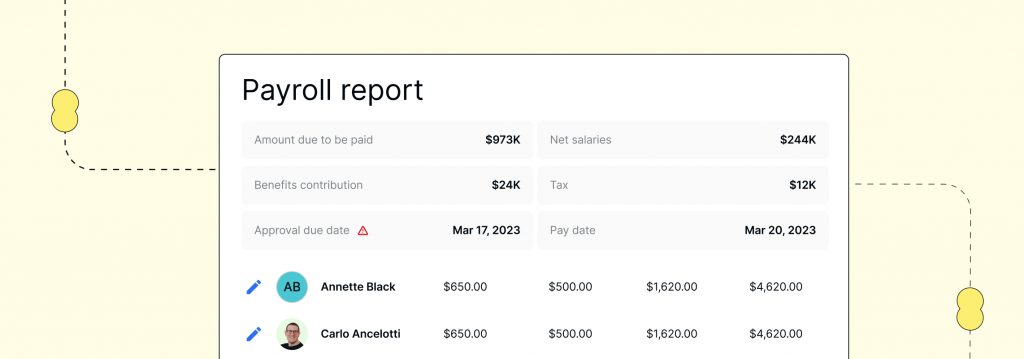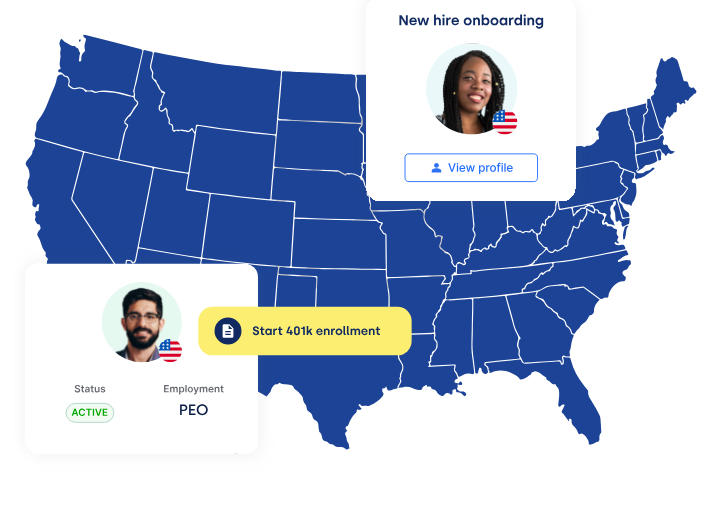Employees are critical to the success of any organization. Consequently, implementing the right human capital strategies can mean the difference between growth and success or stagnation and failure. Choosing a Professional Employer Organization (PEO) can significantly improve efficiency and competitiveness for small and medium businesses (SMB). This guide aims to provide decision-makers with a step-by-step approach to choosing the ideal PEO. From understanding the fundamentals of a PEO and the challenges that drive companies to opt for their services, to establishing criteria for selection and weighing the pros and cons – we cover the essentials to help inform your decision-making process. Also, we highlight Deel US PEO and Payroll as an example of a leading global workforce management solution innovating in the US PEO market.
Defining a Professional Employer Organization (PEO)
What is a PEO? A Professional Employer Organization (PEO) is a third-party outsourcing firm that assumes the responsibility for managing various HR functions for businesses. These functions include payroll processing, benefits administration, compliance management, and risk mitigation. Essentially, a PEO acts as an external HR department, allowing businesses to offload the complexities of HR management, focus on core activities, and ensure compliance with ever-evolving employment laws. How large is the US PEO industry? Here are some key facts on PEOs in the US from the National Association of Professional Employer Organizations
- PEOs are used by over 173,000 small and medium businesses employing close to 4 million workers.
- These 4 million workers were paid $216 billion in wages in 2020.
- Currently there are over 487 PEOs in the US.
Challenges Driving Companies to Choose a PEO
Why do companies choose PEOs? There are several reasons to consider why your company may want to partner with a PEO.
Complex HR Compliance Issues: For business adherence to HR regulations is crucial, the complex and ever-changing compliance landscape can pose significant challenges. PEOs specialize in staying abreast of these regulations, helping companies navigate legal intricacies and reduce the risk of non-compliance. Compliance risk in the US remains high. Additionally, the cost of non-compliance in the US labor markets can have particularly onerous consequences for small and medium-size businesses. For example:
- A $500,000 fine for non-compliance with the Affordable Care Act.
- A $55,000 fine for non-compliance with the Americans for Disabilities Act
- A fine of $1,100 per violation and back wages for overtime violations of the Fair Labor Standards Act.
Key Fact: SMBs spend close to $30 billion each year on legal costs including regulatory, HR and compliance.
Focus on Core Business Activities: Companies thrive when they focus on their core competencies. Whether you’re a startup getting products to market or a more well-established enterprise in a highly competitive marketplace focus matters. PEOs allow companies to outsource time-consuming HR functions, enabling them to allocate resources to essential business activities such as product development, client acquisition, and strategic planning.
Key Fact: Companies using PEOs scored several points higher versus non-PEO companies on business confidence metrics relating to customer service (+7) , competitive position (+9) and innovation (+6).
Employee Benefits Management: Attracting and retaining top talent in any sector requires competitive employee benefits. At present the US labor markets remain exceptionally tight across many regions. In the marketplace for talent there are numerous solutions available to structuring comprehensive benefits packages ranging from entry level to executive compensation. PEOs specialize in managing comprehensive benefits programs, offering access to attractive packages that enhance employee satisfaction and retention.
Key Fact: Employees using PEOs report higher levels (+5) of engagement vs non-PEO employees.
How to Choose the Right PEO for Your Business
Making the decision to partner with the right PEO can materially improve your business prospects. It’s important to understand the key criteria to consider in choosing the right PEO for your business. We offer the following list of criteria to use when considering a PEO.
“The average client of a professional employer organization (PEO) can expect a return on investment – based on cost savings alone – of 27.2 percent”
National Association of Professional Employer Organizations
- Assess Your Business Needs: Before diving into the PEO selection process, conduct a thorough assessment of your company’s HR needs. Identify specific pain points, compliance concerns, and areas where HR efficiency can be improved. Some of these pain points could include company size, market competition, employee turnover, etc.
- Research PEO Providers: Investigate various PEO providers in the market. Look for those with a proven track record in your industry, positive client testimonials, and a robust service offering that aligns with your business requirements. Some are industry-specific, others only operate in certain regions of the country.
- Evaluate Compliance Expertise: Given the intricate nature of HR compliance, prioritize PEOs with a strong focus on compliance expertise. Assess their track record in ensuring clients’ adherence to local, state, and federal employment laws. Find PEOs with strong knowledge of federal, state and local laws.
- Consider Technology and Integration: Evaluate the technological capabilities of potential PEO partners. A modern PEO should offer user-friendly platforms for seamless integration with your existing systems, ensuring efficiency and transparency. Evaluate their tech stack, data security protections as well as the ability to integrate with your business.
- Review Client Support and Services: Examine the level of client support provided by each PEO. Choose a partner that offers responsive customer service, ongoing support, and a range of HR services that align with your business goals. Turnaround time and customer success capabilities are key particularly if your business is in a highly competitive marketplace for prodcuts and talent.

Pros and Cons of Partnering with a PEO
Partnering with a PEO can be an effective strategic option for your business. However, it may not be suited for everyone. Although companies from SMBs to large multinationals use PEOs, the ideal headcount that benefits both the PEO and the client ranges from 10 to 100 employees. As such your organization should consider the pros and cons carefully.
Pros of a PEO
- Cost Savings: Partnering with a PEO often results in cost savings, thanks to their collective bargaining power for employee benefits, reduced HR administrative expenses, and streamlined processes. Average cost savings can be as much as 1,775 per employee with an average ROI of over 27% according to a recent study from NAPEO.
- HR Expertise: Access to seasoned HR professionals is a significant advantage of PEOs. They bring expertise to navigate complex HR issues, ensuring compliance and minimizing the risk of legal challenges.
- Focus on Core Competencies: Outsourcing HR functions allows businesses to concentrate on their core competencies, fostering innovation, growth, and maintaining a competitive edge across industries.
Cons of a PEO
- Loss of Control: Entrusting HR functions to a third party can result in a perceived loss of control. Companies must carefully weigh the benefits against potential challenges related to decision-making authority and company culture.
- Upfront Costs: While PEOs can lead to long-term cost savings, there may be upfront costs associated with onboarding and implementing their services. Businesses should carefully evaluate the initial investment against the anticipated benefits. PEO pricing tends to be a function of payroll or employee headcount. It’s important to understand these metrics for your company before you decide to work with a PEO.
- Customization Limitations: PEOs operate on a standardized model, offering one-size-fits-all HR solutions. This may not align perfectly with the unique needs of every enterprise, posing challenges in tailoring solutions to specific requirements. PEO solutions work with most industries. Some of the industries well suited to a PEO include:
- Real Estate and Property Management
- Engineering services
- Health services
Deel US Payroll Dashboard

Deel US PEO and Payroll:
In the PEO market, Deel emerges as a unique player, particularly for businesses with a global footprint. Deel ranks as the leading all-in-one global HR platform that supports companies with contractors or direct employees. Deel’s US PEO and Payroll Services cater specifically to the needs of businesses, offering a range of services designed to simplify HR management at home or abroad. Additionally, the company allows businesses to seamlessly combine payroll, benefits dealing with the ability to handle a range of HR issues from state tax compliance to terminations and worker claims. Key advantages to Deel’s platform include:
- Access to economies of scale for company benefits and benefits administration.
- Deel HR to manage your entire workforce: Deel HR is a free service for companies with less than 200 employees.
- Training, HR policies, and on-demand HR support
- Advanced tax and benefits compliance
Other benefits of partnering with Deel include:
- Nationwide Coverage: Deel serves employers in all 50 states across all industries with a team of in-house experts knowledgeable with federal, state, and local labor laws.
- Market Leading Customer Service: Deel provides a dedicated CSM with a 24/7 in-app chat and a 1.25 min FRT (First Response Time). The ensures quality support and the ability to have questions answered promptly.
- Security and Data Protection: Deel’s platform provides tight data security and protection. The company is SOC2 and ISO 27001-certified. They also offer GDPR-compliant solutions with the ability to integrate with multiple SSO providers.
Deel US PEO Nationwide Onboarding and Benefits Enrollment

For US small and medium enterprises (SMEs) expanding internationally or international SMEs seeking to enter the US markets, Deel offers benefits. Companies can take advantage of Deel’s global footprint (150+ countries) and variety of services, including Global Payroll and Employer of Record (EOR). Whether companies are seeking to expand into fast-growing US markets or take advantage of geoeconomic trends, e.g., nearshoring or reshoring, Deel can address your needs. Most importantly, Deel’s platform is flexible and designed around scaling and optimizing support as your business grows.
Staying Competitive
Finally, choosing the right Professional Employer Organization for your SMB is a strategic decision that demands careful consideration. It can have far-reaching consequences in the near and long term, so getting it right is important. Companies using PEOs boast higher levels of employee engagement and retention, faster revenue growth, and stronger competitive positions. Additionally, these benefits of partnering with PEOs are clear, as 98% of SMBs using PEOs would recommend its use to their peers. However, PEOs only account for 15% of business with 10-99 employees, suggesting much more room for growth. The landscape of HR and compliance continues to evolve as federal, state, and local laws are constantly changing. As such, by establishing clear criteria for selection and weighing the pros and cons, businesses can navigate the complexities of HR management and ensure a seamless partnership with PEOs such as Deel that best aligns with your business goals.
For more information or to discuss use cases contact ClearSky 2100. To book your free demo contact the team at Deel.
Disclosure: At ClearSky 2100, our portfolio partly consists of affiliate partnerships. We may earn a small commission from buying links on our site at no cost to you.






